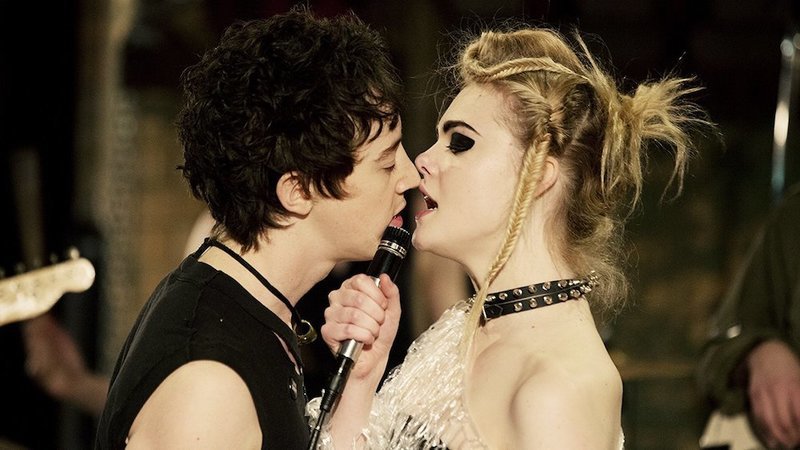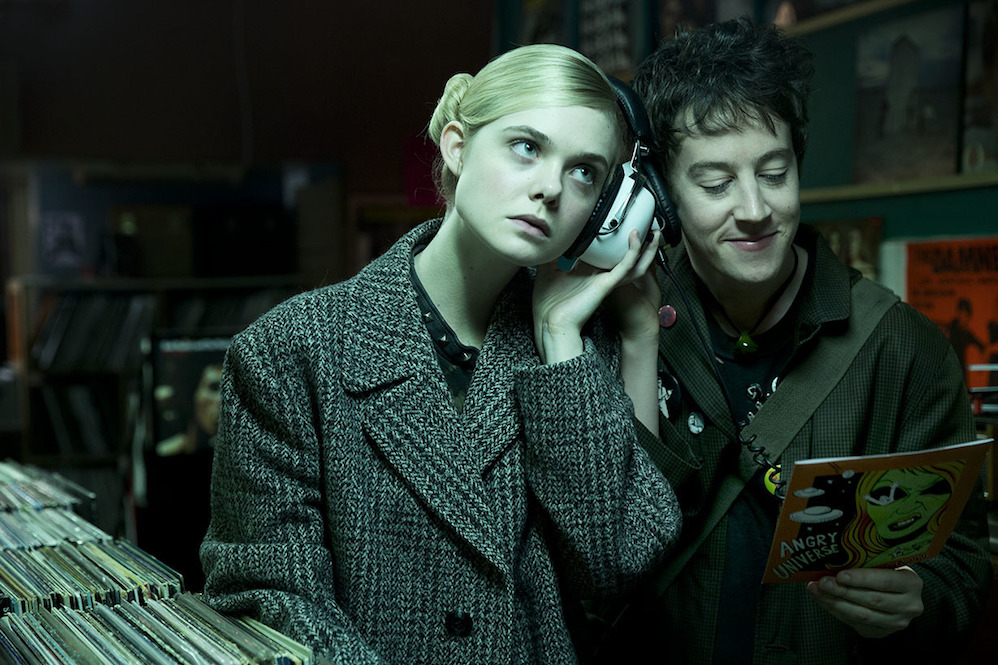Neil Gaiman’s short story How to Talk to Girls at Parties is about three teenage boys in the 1970’s who love punk. They know so little about girls that when they wander into the wrong party and get mixed up with humanoid-looking aliens they can hardly tell the difference. Gaiman produced the film based on the story, with a screenplay by Philippa Goslett and director John Cameron Mitchell (“Hedwig and the Angry Inch,” “Rabbit Hole”) and a breakthrough performance by Tony-winner Alex Sharp in his first movie role. In an interview with RogerEbert.com, Mitchell talked about punk in the ’70s and now and what Gaiman told him was his most important goal for the film.
I loved your party scene in “Shortbus,” and you really exceeded it this time. Tell me about imagining and creating the party for this film.
It is two subcultures, punks and aliens; two tribes who are outsiders suddenly mix. They don’t seem to have much in common, but of course love bridges that gap in the classic Romeo and Juliet way and the most rebellious of the aliens runs off with the meekest of the punks and then our story begins. The other two boys have their own subplots, of course, too.
For costumes, we were blessed to have the great Sandy Powell who I’ve known socially and who’s won three Oscars and whose first film was with Derek Jarman. So this felt like a return to form for her, back to the low budget British punky thing. I said I was thinking of aliens from the seventies, chakras with color schemes. She said “latex, latex, latex,” and I was like, “I love it, I love it, I love it.” We thought about bands like the Rezillos, a Scottish pop-punk band who had a space-age thing and a designer named Pam Hogg who was very influential at that time. Punk also harks back to the ’60s with the new wave like Gary Numan and Divo. The geometric stuff and the colors were dictated by the chakras so that really set her on her path and I just let her go.
What is your definition of punk and why is it meaningful to these boys?
I like the fact that Elle Fanning’s alien character keeps asking what punk is and never really gets an answer. It wouldn’t be punk if you could fully define it. It’s like obscenity; you know it when you see it. There are certain attributes that are generally associated with punk: a suspicion of authority, an awareness of oppression, and trying to fight it. Of course that’s a bit of an oxymoron. Someone’s going to get hurt if you’re smashing. Punk is also questioning the way things are, being suspicious of things just because that’s the way they’ve always been done.

Isn’t that literally the definition of being a teenager?
Lately I feel like for a lot of young people, at least let’s say millennials, there’s such a weird storm of 9/11 followed by economic collapse, followed by the Internet and social media saturation that serves to kind of douse youthful rebellion. It all kind of paralyzed them into thinking that nothing can really change. First of all, it was terrorism, then it was an economic rug being pulled out from under them, coming out of college, not having a job, suddenly feeling old because you have a $100,000 loan or at least $20,000 and then the Internet which gives you a false feeling of accomplishment because you’re zipping around on it but not doing a whole lot on it. Of course some people certainly use it as a very good tool but for a lot of people it is just an equivalent to worry beads, just to check, check, check and post, post, post and selfie, selfie, selfie. That’s the worst example, of course, and there are plenty of people who use it as a tool in a good way but it can serve to make young people not necessarily the vanguard of any change in the last 15 years. There might be rebellion but it isn’t directed rebellion in any way.
There’s no mass movement possible anymore because of digital culture. The last real musical movement was grunge. After that, everything was atomized; sliced and diced. Porn got sliced and diced into what fetish you were into and boys are saturated with porn before they have sex. So, when they have sex they are imitating it rather than just being it or trying it and girls are kind of just going along with it, and then sexualizing themselves whether they want to or not because that is currency. It is an imitation of porn and it didn’t feel sui generis, it felt quickly commercialized. Even sexual top or bottom became a capitalist kind of thing that you have to be if you’re on Grindr and it was important to decide so you can present yourself with all the things people used to find out about each other when they got to know each other established up front. So, everything started becoming quantifiable and sellable.
Capitalism does that but now it is done in a very efficient way because of digital media, so that serves to dampen the young person being at the vanguard of actual change as opposed to surface rebellion. The old people got scared about things changing became punk and they voted Trump in and they are welcoming him smashing all tradition. They don’t care anymore that he is inept. They are watching it burn. They didn’t believe that he wasn’t going to be corrupt and or that he’s going to drain the swamp. They just saw someone going in there like a child has got the controls. It’s like, “What’s been happening so far sucked, so might as well do this throw a monkey in the driver’s seat,” and some of them are still enjoying it; it’s kind of mindless punks as opposed to any focused punks.
The new possible kind of punk that I can see coming is like the Parkland teenagers. These are the post-millennials. They are coming up in high school with Trump in office and they can’t believe it and they’re getting shot up and there is one thing that they can do, maybe stop the NRA. That is one issue I think is going to hopefully be the beginning.
I think punk changes for every era but we know it when we see it and usually it’s about smashing up stuff so that new stuff can grow.
Neil Gaiman produced this film. What did he say was important to him?
He wanted to make sure it didn’t become another off in space giant bloated budget special effects movie. The higher the budget goes, the dumber the story has to be because you have to play in all markets including China which doesn’t allow for cultural specificity or a queer element. It flattens it out, which is what Marvel has become and all of Hollywood has become. He said, “I just don’t want it to go off in that direction, I want it to stay on Earth and be a day in a life.”
Your special effects musical number has a ’70s analog feeling.
I think of that more of as an animation musical moment rather than special effects. It was John Bair who designed the bouncing wig in “Hedwig” and also did the animation in “Shortbus.” It was a little bit inspired by “Liquid Sky” because we wanted a ’70s and ’80s look about the animation with that slightly cheesy primary color. In some ways all of my films are ’70s midnight movies with heart. I want them to have a lot of heart. This musical animated number was just like what the nuns told me in school; if you dance too long you get pregnant. So it’s a punk rock conception. They somehow fertilize each other in their minds, in space, in their dreams, in a sort of acid-drenched punk rock song.

Tell me about casting Alex Sharp in his first film role.
I did a search of the UK and could not find Enn. I found very good actors but I couldn’t find anyone who had a perfect mix of someone who could be one of the boys but could be a virgin, could be a nerdy smart guy but could also be timid and look the right age and do the British thing correctly. I was at a Tony Awards event the year that we both won Tonys and I looked at him and I said: “Jesus Christ, that’s Enn!” He was terrified but I taught him everything he knows about film and he says he’s spoiled now.
What direction did you give him that he found especially helpful?
I said, “Stop thinking about your body; just give yourself an image in your head and the body will follow.”
The boys in your movie are both inexperienced and punks and so everything is equally new to them, which makes them refreshingly open-minded. They are inclined in favor of anything that breaks the rules.
That’s also a bit of a British idea, and it’s a bit of a fairytale obviously. In the seventies, everything was more acceptable, wasn’t it? We didn’t have the Internet to check everything out so when they saw something strange, everyone was like “Well, I guess that’s what they do.” It’s a very brave thing to just get on with it and to accept it. Not that you’re actually going to be tolerant of it but you’re just kind of like getting on with it. The joke of course from the short story is that when you’re dealing with someone that you are sexually attracted to whatever comes out of their mouth is somehow acceptable. If the boys attribute whatever is strange to their being girls or being American or being in a cult and that can explain it, then fine. They’re teenagers and everyone is an alien when you’re in love.












